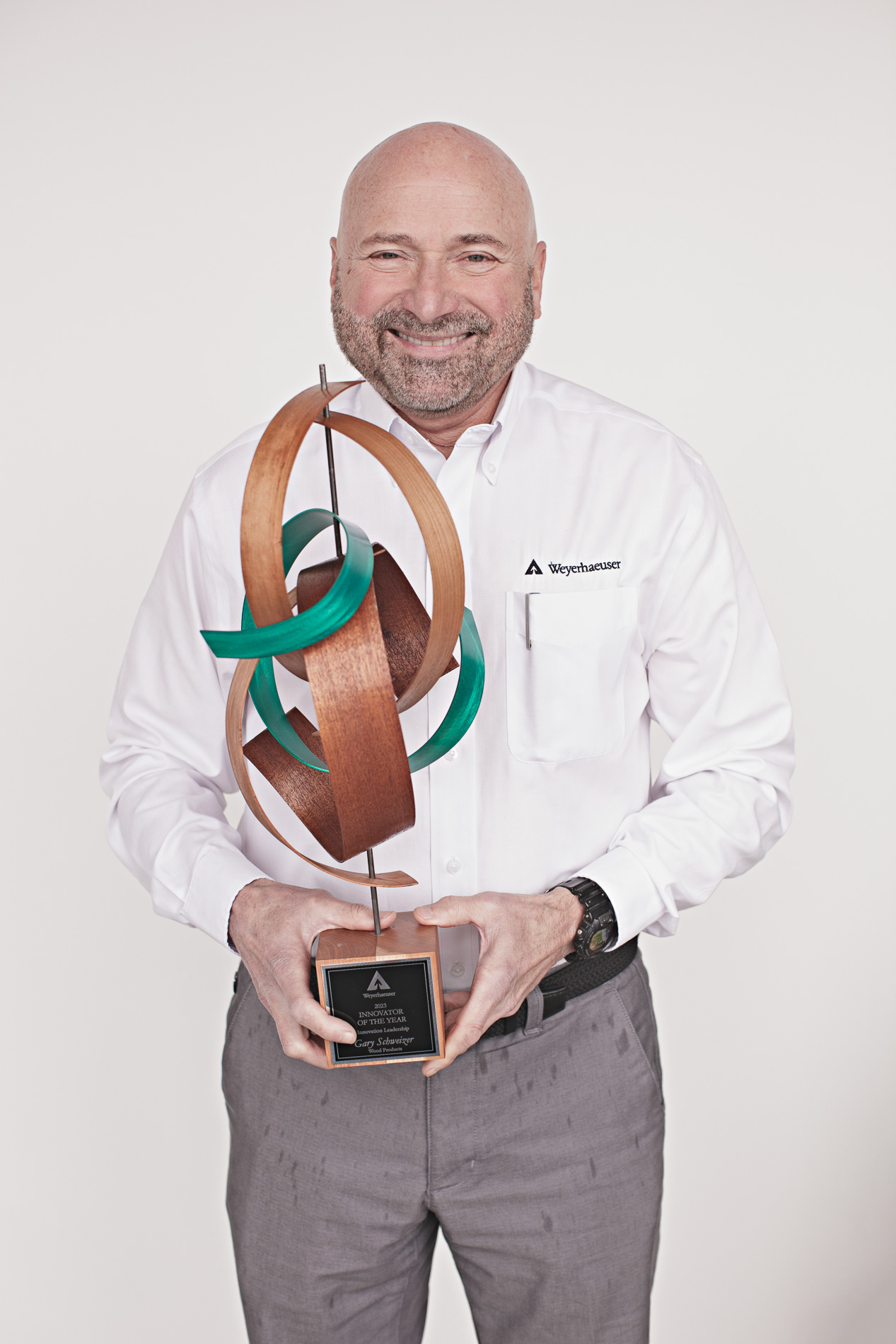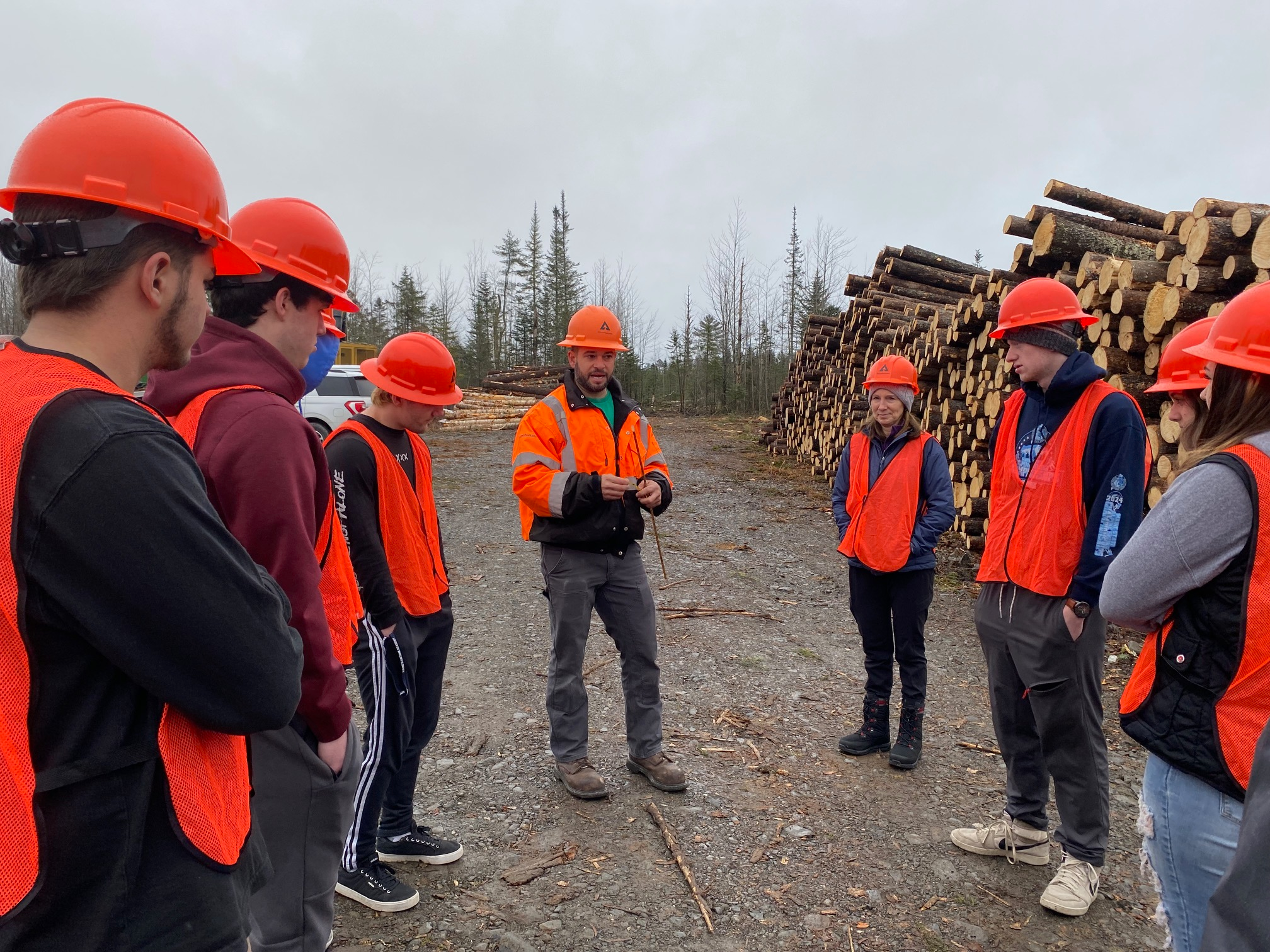
Omar working as a lube technician in 2016, in front of a loading shovel.
This past September, Omar Mell celebrated his one-year anniversary as harvest manager at our Mount St. Helens tree farm in Washington state. It was a big milestone for the eight-year Weyerhaeuser veteran, who describes his career as “kind of like a Cinderella story.”
Omar has been in the industry for decades, including a high-school job at a tree nursery where his mother worked, and stops at a few lumber mills after graduation. He then worked as a contract logger for a yarder outfit called Skyline Thinning .
“I remember looking up the hill at the landing and thinking about how it’d be nice to be in the harvest manager’s pick-up,” Omar says. “But I never really saw myself there.”
Omar’s mindset started to change after Skyline went out of business and he became a Weyerhaeuser employee, working as an hourly union logger in Springfield, Oregon — and he began exploring new opportunities and advancing his career over the next few years.
FROM CHOKERS TO TOWERS
In Springfield, Omar started setting chokers, a challenging job that involves traversing steep slopes and wrapping cables around felled logs. Eventually, he became a hook tender — a role akin to a foreperson — overseeing the team’s day-to-day work, and after the yard crew disbanded he took on a lubrication technician role in our truck shop.
After a few years of oiling pick-ups, shovel loggers, loaders, processers and other equipment, he was asked to join Western Timberlands’ tower logging team. The group’s task was to consult with contractors to improve the safety and efficiency of this highly technical logging method.
“We counseled contract logging crews, mostly on safety,” Omar says. “From proper rigging to in-the-clear procedures, our goal was to help our contractors eliminate the risk of life-altering injuries on the job site.“
Omar’s fluency in Spanish came in handy, too. Many contract crew members are Spanish speakers who learned English as a second language.
“I helped them understand the nuances and translated acronyms and hard-to-understand terms,” Omar says.
For two years, the part-time role took Omar all over Western Timberlands. It was an opportunity for him to make connections across the region, show off his logging knowledge and skillset and demonstrate leadership skills, and he was one of the recipients of a 2019 Timberlands Recognition of Excellence Award for Safety.
But mostly, he was still lubing vehicles — and his heart was in the woods.
Omar rigging a tree in 2009.
PLANTING A SEED
In 2019, Ron Friese, a now-retired harvest manager in Aberdeen, Washington, asked Omar if he’d ever thought about a harvest manager role. The job involves managing contract and company logging crews and ensuring their obligations in safety, environmental stewardship and more.
“I jokingly told him it’d be too much paperwork,” Omar says. “But he got me thinking about the possibility of a change.”
That evening, Omar told his wife Shannon about the conversation.
“She asked what I had to lose, and we started talking about what something different might look like,” Omar says. “The more I thought about it, the more a management role seemed like a dream come true.”
Not long after, Connor Meehan, a harvest manager and one of Omar’s colleagues on the tower logging team, told him about an opening on the St. Helens tree farm in southern Washington. Omar applied in the middle of the 2020 fire season.
“I went home and told Shannon the news, and she was supportive,” he says. “I was worried because it would require moving our family, but she reminded me not to get ahead of myself and wait to see what would happen. And she was right. We didn’t need to think about moving unless I got it.”
READY TO LEARN
After his interview, Omar didn’t feel confident.
“The interview was short, and afterward I felt like I had focused too much on the things I didn’t know, what I needed to learn,” Omar says.
The opportunities for improvement he identified ranged from developing better computer and administrative skills to understanding environmental regulations in Washington state.
But Omar reminded himself on the drive home that being truthful was more important than anything else.
“I told Shannon I didn’t think I’d get it,” Omar says. “Then a week later I got an offer. I was shocked but really happy.”
It turns out his honesty gave the interview team confidence. They sensed that Omar was humble enough to admit what he didn’t know and ambitious enough to learn new things.
MAKING THE MOVE
Two weeks later, Omar took the family’s camping trailer to Washington, where he lived for almost a year until his family joined him.
He and Shannon wanted their four children, ages 4 to 18 at the time, to stay in Oregon during the uncertainty of the pandemic. Plus, that gave Shannon time to decide whether she wanted to look for a new job as an in-home caretaker in Washington or become a full-time stay-at-home mom. She chose the latter.
After a year of family reunions on weekends, holidays and vacations, the Mells bought a new home in Washington this fall. Omar says he’s feeling more and more comfortable in his new role.
“When I became a harvest manager, I understood the work itself,” Omar says. “But there’s an added responsibility in terms of the safety of the contract team and protecting our license to operate.”
As far as transitioning from hourly to salary, Omar says the most significant change was setting his own priorities and figuring out how and when to get the work done.
“It took six or seven months to fall into a rhythm, and I’m still getting used to all the online meetings,” he says with a chuckle. “But I’m still learning, still growing and — most importantly — still thinking I’m in the right position.”
Omar and his wife, Shannon, with three of their four children: Anna-Maria at far right, Abrisa at far left and Dante in the center.
Omar with his oldest son Andreas and Andreas’ fiancée Sadhia.
ADVICE FROM OMAR
- Have a plan, especially with family. We were lucky, in a sense, that the pandemic made the transition a little easier for our three kids in school since they were learning remotely. But moving is challenging, whether it’s down the block, across the country or somewhere in between.
- Ask a lot of questions and have an open mind. In any role, keep learning on the job. But also tap into the people around you who are willing to help you learn and grow. Asking for advice is a strength, not a weakness.
- If you have the chance to participate in a temporary project, seriously consider it. It’s a chance to grow your skills and expand your relationships, even if you wind up going back to your full-time job. If I hadn’t joined the tower logging team, I wouldn’t be where I’m at today.
Omar was recently featured in a recruiting video for Western Timberlands.


